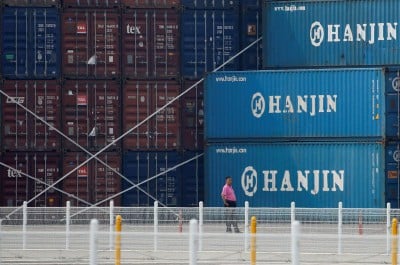 © Reuters. HK50 -0.89% Add to/Remove from Watchlist Add to Watchlist Add Position
© Reuters. HK50 -0.89% Add to/Remove from Watchlist Add to Watchlist Add Position Position added successfully to:
Position added successfully to:
Position added successfully to:
Investing.com-- China’s trade balance grew more than expected in November, aided by a surprise rise in exports as they snapped a six-month losing streak, although an unexpected drop in imports still indicated continued weakness in local demand.
The country’s trade surplus grew to $68.39 billion in November from $56.53 billion in the prior month, data from the Customs Administration showed on Thursday. The reading was more than expectations for a surplus of $58 billion.
The trade balance also improved from its worst level in over a year.
Exports grew 0.5% in November from the prior year, beating expectations for a drop of 1.1% and improving from the 6.4% drop seen in October. Chinese exports also grew for the first time since April this year.
The reading showed that Chinese businesses saw some improvement in overseas demand, even as economic conditions in the country’s biggest export destinations continued to deteriorate.
Official purchasing managers index data released last week showed that Chinese business activity was also declining due to weak overseas demand. But private surveys had shown some signs of improvement in offshore orders.
But despite the mild improvement in exports, Thursday’s trade data still signaled continued weakness for the Chinese economy. Imports unexpectedly fell 0.6% in November, missing expectations for a rise of 3.3% and declining after a 3% gain in the prior month.
The reading indicated that local demand remained languid despite continued stimulus measures from Beijing, while recent weakness in the yuan was also eating into purchases of foreign goods.
Thursday’s data also showed little improvement for China’s economy, which is struggling with a sluggish post-COVID economic rebound. Weak local demand also bodes poorly for inflation, after China slipped into disinflation territory in October.
Ratings agency Moody’s had earlier this week threatened to downgrade China’s credit rating, and also slapped the country with a negative outlook rating, citing risks from a property market meltdown, as well as middling stimulus measures from Beijing.